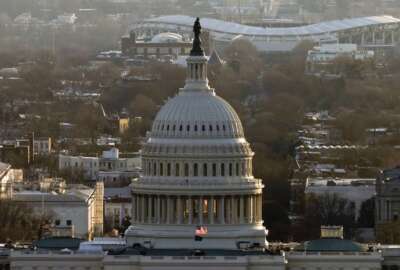As shutdown stretches on, 3 things for contractors to consider
Government contractors have not been immune from the effects of the shutdown. From a flurry of stop-work orders to a heightened — some say "cutthroat" — sense...
wfedstaff | April 17, 2015 5:38 pm
Government contractors have not been immune from the effects of the shutdown. From a flurry of stop-work orders to a heightened — some say “cutthroat” — sense of competition in contracts that have, so far, been unaffected by the shutdown, contracting experts say companies are feeling the shutdown burn.
Top experts from the procurement realm address some of the effects and challenges of the shutdown.
1 |
The low-down on stop-work orders
It’s likely no surprise that companies with contracts paid for out of appropriated funds are being issued stop-work orders, since congressional appropriations for the current fiscal year lapsed last week.
“There’s no money to pay you and the government can’t incur debt without having appropriations to cover their obligations, so they issue stop-work orders,” said Larry Allen, president of Allen Federal Business Partners, in an interview on In Depth with Francis Rose.
But even contractors working on projects using carry-over fiscal 2013 funding could be presented with work stoppages.
“In some cases, because of the shutdown, there’s no one on the government site who can receive whatever you might be trying to deliver to them,” Allen said. “In a shutdown where you have thousands of government employees sitting at home … there aren’t always people there covering the reception points or loading docks, so companies can be getting stop-work orders on those types of contracts as well because — even though they’re all paid for with FY ’13 funds — there’s nobody there to take deliveries.”
Similarly, contractors working under time-and-materials contracts could face stop-work orders.
“There’s concern in those federal agencies that a contractor is incurring cost — they are billing for time — during which time the government is closed for business,” Allen said. “So, technically, the government is incurring an obligation to pay a contractor for its work during a time for which they don’t have funds available for that obligation — thus, the stop-work order.”
2 |
Don’t stop planning
Despite the shutdown, many of the federal government’s contracting heavy-hitters have staff remaining on the job.
For example, thanks to the Pay Our Military Act, the Defense Department recalled most of its furloughed employees, including personnel at the Defense Contract Management Agency and the Defense Contract Audit Agency, which had threatened to create stoppages and delays in the procurement process.
Parts of the General Services Administration and the Interior Department — two agencies funded in large part by user fees — have remained more or less unaffected by the shutdown.
“There are still plenty of people sitting idle, particularly contractors that work on government sites, but more and more you do see federal employees doing work, even though they’re not getting paid for it right now,” Allen said.
That means contractors should continue their planning efforts for when the government does fully reopen.
“While you can’t get any new task orders that rely on appropriated funds, this is still a very good time to build your own pipeline — have the discussions with government agencies, with buyers, about what their plans are. To the extent that you can guide them, this is a good opportunity to have. These are the types of things, by the way, that should be going on at the start of a fiscal year, anyway.”
When appropriations lapsed last week resulting in the first government shutdown in more than 17 years, there was a “palpable sense of deer-caught-in-the-headlights all across this area,” Allen said. But it’s now time to move on and make the most of a bad situation, he added.
“Last week was very much a lost week,” Allen said. “But just because we lost that week doesn’t mean we should be losing the month of October. There’s still things to be done here; there’s still planning that has to happen.”
3 |
Uncertainty driving a ‘cutthroat’ climate
With no deal on fiscal 2014 funding in sight, contractors expect the uncertainty to continue, experts say.
“Even if this shutdown is somehow resolved in a relatively short period of time — I guess depending on what you consider relatively short — there’s no certainty that things are going to get better in the near future,” said Lee Dougherty, a partner with Fluet, Huber & Hoang, in an interview on In Depth with Francis Rose. “I think there’s this idea that we’re going to continue to have these struggles.”
That sense of uncertainty is already driving more “cutthroat” competition in the contracting realm, Dougherty said.
“Rather than having an across-the-board shutdown, we have a lot of programs that aren’t shut down,” Dougherty said. “So what companies seem to be doing in some cases … is on those programs where they are not shut down, they are trying to maximize cash flow to the greatest extent possible.”
In practice, that’s meant some large prime contractors have maximized their own work by booting subcontractors off — even in cases where contracts between the two bar such maneuvers.
“Even though they believe they may lose a case that’s litigated, they need the cash now, and so they’re willing to risk that litigation in order to maximize the cash flow today,” Dougherty said.
“I’ve probably written more cease-and-desist letters this week than I’ve written all year,” he added.
Lawmakers and the White House have made little progress in coming together to resolve the shutdown and hammer out an agreement on fiscal 2014 funding. And it appears likely that another looming deadline — this one over the debt ceiling — could eclipse the shutdown in negotiations.
“It goes from worse to ‘worser,’ as they say,” said Eric Crusius, a partner with the Centre Law Group. The firm has published a white paper on how contractors can navigate the budget fights.
But the outlook isn’t optimistic.
“If you’re lucky enough to have a contract that hasn’t been stopped because of the shutdown, then you have the unlucky task of performing work (and) because of the debt ceiling impasse, not getting paid for it,” Crusius said.
RELATED STORIES:
Contractors’ fate uncertain even as DoD civilians return from furloughs
DoD to bring back most employees from shutdown furlough
Under shutdown, a complicated picture emerges for contractor employees
Copyright © 2025 Federal News Network. All rights reserved. This website is not intended for users located within the European Economic Area.





